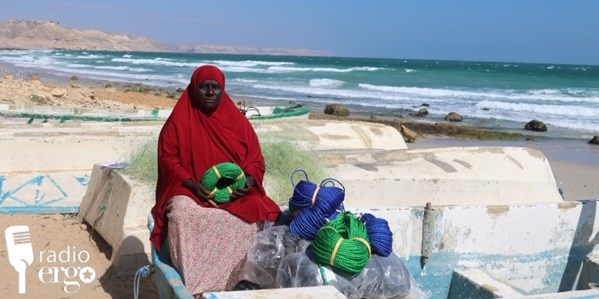
Wednesday March 5, 2025

Buuxo preparing for a fishing expedition / Mohamed Nadiif/Ergo
(ERGO) – Since receiving fishing equipment last December, Buuho Mohamed Muse, 50, has been running a thriving business selling fish and managing her own fishing boat in northern Somalia’s Bari region. She earns enough to support her family’s needs and save for the future.
From her business selling cooked and raw fish, she earns $5-10 a day. Her boat, operated by four fishermen, brings in at least $200 a month. Traders often purchase her fish wholesale for distribution across Puntland.
“It’s enough for breakfast, lunch, and dinner. I buy rice, sugar, pasta, flour, and use the fish both as income and food. It feels good, and I aspire to achieve even greater success,” Buuxo said.
She had been relying on relatives to feed her four children. She also takes care of the children of her daughter who died.
“Children who couldn’t afford schooling due to financial constraints now attend primary school, where we pay $26 monthly. I no longer worry about affording their education or basic necessities,” Buuxo told Radio Ergo.
“I used to face many challenges, but now I don’t think twice about buying books or meeting my children’s needs. They’re getting the education I always wanted for them.”
Buuxo is one of 79 individuals in Bandar-bayla district, Bari region, who received training and equipment such as nets, coolers, motors, and other materials provided through a project run by Norwegian Refugee Council (NRC). The initiative called TeREFic aims to ensure sustainable economic stability for local fishermen.
Her husband’s boat, abandoned since his death in 2018 due to repair costs, is now operational. Buuxo has saved $600 so far.
“If I reach a higher level in business, I’ll either start a company or open a large store. That’s my current goal,” Buuxo stated.
Mohamed Omar Osman, previously hindered by lack of equipment, now earns between $600-800 a month, which is the most he has ever made in his 25-year career.
“Our family’s daily life has improved significantly. These tools have been incredibly useful. With calm seas and favourable weather, fishing has met many of our needs,” Mohamed explained, praising the NRC project.
Previously unemployed, Mohamed struggled to support six children. And relied on his aunt in England supported him financially for rent and food.
“I’m grateful for my aunt’s help, but I worried about depending on someone else who couldn’t fully meet our needs. Now, I’m a fish trader delivering to districts and areas across Bari region,” Mohamed said.
“I pack around 100 kilos of fish in a small refrigerator, clean and prepare them, then deliver to Qardhood hotels in Bayla. Selling at $3 per kilo, I make a profit of about $1.5 per kilo. My family’s bills are covered regularly from my income.”
More than 2,000 fishermen live along Bandar-bayla’s coast, yet many lack proper equipment, according to Isse Omar, deputy chairman of their cooperative. He emphasised the need for further support.
“People who had nothing and couldn’t afford to fish received equipment and support. Selected based on resource scarcity, they’ve recovered economically and created jobs for others. We urge similar opportunities for all coastal residents,” Isse said.
He highlighted the abundant resources accessible to anyone with adequate equipment as the unique advantage of living by the sea.
“Coastal communities possess an opportunity unavailable elsewhere – an endless sea rich with resources. With proper equipment, people can benefit greatly and reduce dependency on external aid,” Isse added.